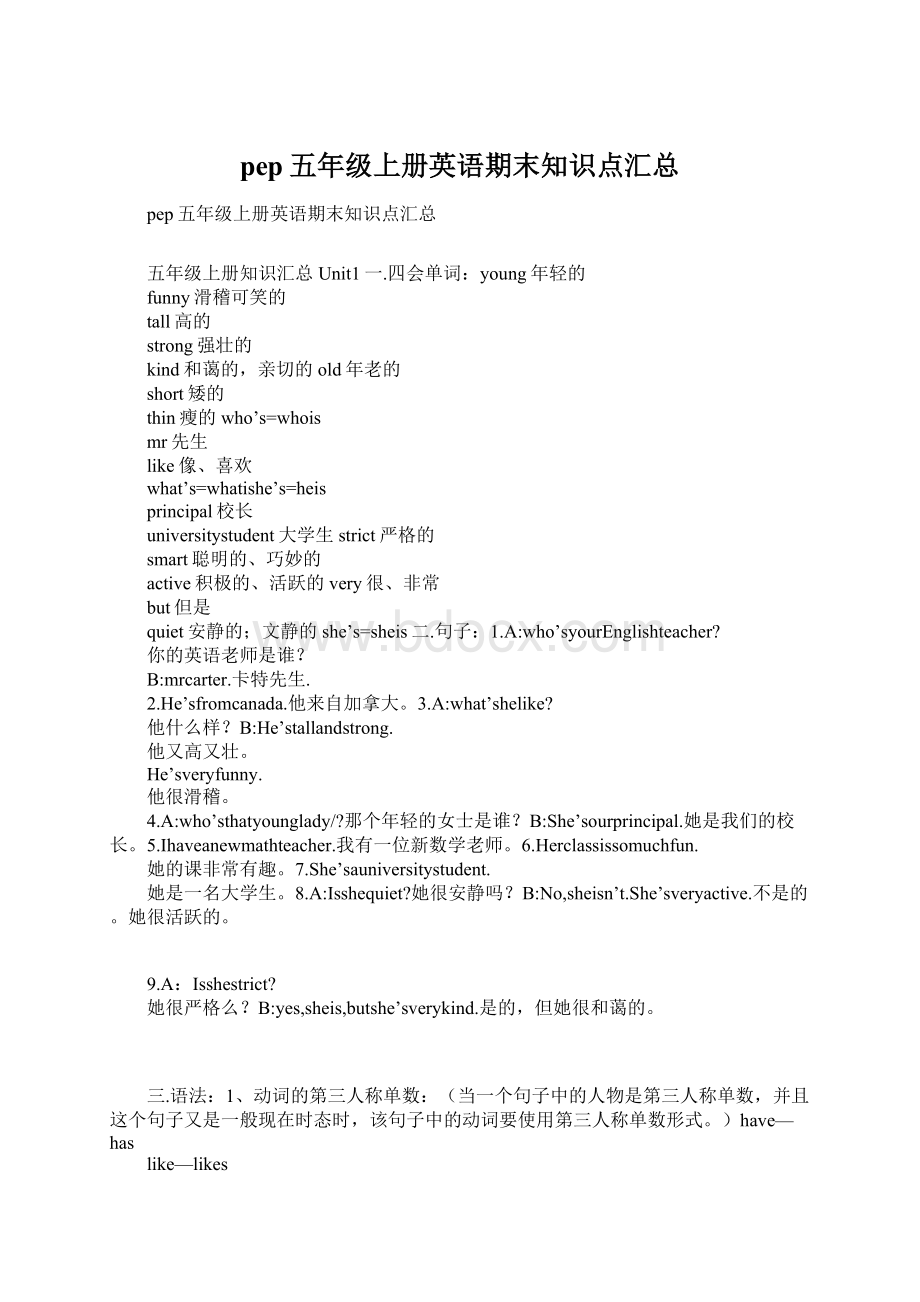pep五年级上册英语期末知识点汇总文档格式.docx
《pep五年级上册英语期末知识点汇总文档格式.docx》由会员分享,可在线阅读,更多相关《pep五年级上册英语期末知识点汇总文档格式.docx(8页珍藏版)》请在冰豆网上搜索。

B:
He’stallandstrong.
他又高又壮。
He’sveryfunny.
他很滑稽。
4.A:
who’sthatyounglady/?
那个年轻的女士是谁?
She’sourprincipal.她是我们的校长。
5.Ihaveanewmathteacher.我有一位新数学老师。
6.Herclassissomuchfun.
她的课非常有趣。
7.She’sauniversitystudent.
她是一名大学生。
8.A:
Isshequiet?
她很安静吗?
No,sheisn’t.She’sveryactive.不是的。
她很活跃的。
9.A:
Isshestrict?
她很严格么?
yes,sheis,butshe’sverykind.是的,但她很和蔼的。
三.语法:
1、动词的第三人称单数:
(当一个句子中的人物是第三人称单数,并且这个句子又是一般现在时态时,该句子中的动词要使用第三人称单数形式。
)have—has
like—likes
do—does
go—goes
watch--watches2、词语变化:
fun――funny
funny(名词形式)――fun
know――no
反义词:
tall—short
long—short
young—old
strong—thin
active—quiet
kind—strict
active—quiet3、belike与dolike:
在本单元中,what’s…like?
的句型是主句型,这里的like是“像…一样”的意思.what’s…like?
是问某某长得什么样子。
它的答语一般用:
He/She/Itis…,如:
what’syourfatherlike?
你爸爸长得什么样子?
。
而在dolike的句子中,like的意思才是“喜欢”的意思。
如:
whatdoesyourfatherlike?
你爸爸喜欢什么?
4mr—先生miss—小姐(未婚)mrs—夫人,女士(已婚)四.语音:
字母组合:
ea
peach
tea
seat
jeans字母组合:
ee
beef
sheep
queen
sleepUnit2一.单词:
monday星期一
Tuesday
星期二
wednesday星期三
Thursday
星期四
Friday
星期五
day天;
日子have有;
吃
on在……时候
dohomework做作业watchTV
看电视
readbooks读书
Saturday星期六
Sunday星期日
whatabout…?
……怎么样?
too也;
太二.句子:
1A:
whatdayisittoday?
今天星期几?
It’swednesday.
星期三。
2.A:
whatdoyouhaveonThursdays?
星期四你们有什么课?
wehaveEnglish,mathandscienceonThursdays.
在星期四我们有英语,数学和科学课。
3.IlikeThursdays.
我喜欢星期四。
4.A:
whatdoyoudoonSaturdays?
星期六你常常做什么?
Ioftendohomework,readbooksandwatchTV.
我经常做作业,读书,看电视。
5.A:
whataboutyou?
/Andyou?
你怎么样?
/你呢?
Idomyhomework,too.我也做作业。
三.语法:
、当介词in,on,at后面跟表示时间的词语时,表示在某年或某月(当只有年和月的时候),用in.如inmay在五月。
In1988,在1988年。
表示在某段时间,如在上午,下午,晚上也用in.如inthemorning,intheafternoon,intheevening.表示在某日,在星期几时,用on。
如onmonday,onSunday.表示在几点几分,在具体时间时,用at.如at6:
30,
at9o’clock.2.Ilikemondays.johnlikesSundays.这里的likes是like的第三人称单数形式,在一般现在时的句子中,如果主语是第三人称单数,注意动词要变成三单形式。
3、理解、区分这两个句型A:
whatdoyouhaveonmondays?
wehavechinese,English,mathandscienceonmondays.A:
whatdoyoudoonmondays?
Ioftendohomework,readbooksandwatchTV.四.语音:
ow
how
town
brown
now字母组合:
ou
our
mouth
mountain
houseUnit3一.单词:
cabbage洋白菜;
卷心菜pork
猪肉
mutton羊肉
eggplant茄子fish鱼
greenbeans青豆tofu
豆腐
potato土豆tomato西红柿
for为;
给
lunch中餐
we我们healthy健康的;
有益健康的tasty好吃的
sweet甜的
sour酸的fresh新鲜的
salty咸的
favourite最喜欢的they’re=theyare
fruit水果
grape葡萄don’t=donot不;
非第三人称单数的否定形式二.句子:
whatwouldyoulikeforlunch?
午饭你想吃什么?
I’dlikesometomatoesandmutton.我想吃西红柿和羊肉。
whatdoyouhaveforlunchonmondays?
星期一你们午饭吃什么?
wehavetomatoes,tofuandfish。
我们吃西红柿,豆腐和鱼。
what’syourfavouritefood?
你最喜欢的食物是什么?
Fish.鱼。
4.A:
what’syourfavouritefruit?
你最喜欢的水果是什么?
Ilikeapples.Theyaresweet.我喜欢苹果.它们是甜的.
Ilikefruits.ButIdon’tlikegrapes.They’resour.
我喜欢水果.但是我不喜欢葡萄.它们是酸的。
1、Ihaveeggplantandtomatoesforlunch.我午饭吃茄子和西红柿。
这里的eggplant是指一道菜,是被切碎了的,熟的,所以这里的eggplant是不可数名词,不能用复数形式。
西红柿
tomato
和土豆potato复数形式在后面加estomatoes,potatoesfish
当表示为活的鱼的时候,是可数的,但它是单复数同形;
当表示为鱼肉的时候,是不可数的。
cabbage
当表示是一种包菜的数量时,是不可数名词,表示为cabbage;
当表示不同种类的包菜时,是可数名词,表示为cabbageseggplant
当表示是未经过烹饪的蔬菜时,是可数名词,表示为eggplants;
当表示经烹饪过的菜肴时,是不可数名词,表示为eggplant常见的肉类为不可数名词,pork
mutton
beef等2.下列单词的形容词形式:
health---healthy(健康的)
taste---tasty(好吃的)3.what’syourfavoritefood?
后面一般都跟集合的名词:
food食物
drink饮料
colour颜色
class课程book书sport运动vegetable蔬菜number数字
day天四.语音:
window
yellow
snow
grow字母组合:
oa
coat
boat
goat
roadUnit4一.单词:
emptythetrash倒垃圾
cookthemeals做饭
watertheflowers浇花
sweepthefloor扫地
cleanthebedroom打扫卧室makethebed铺床
setthetable摆餐具
washtheclothes洗衣服
dothedishes洗碗碟
putawaytheclothes收拾衣服can’t=cannot(不会;
不能)useacomputer(使用计算机)二.句子:
1.I’mhelpful!
Icansweepthefloor。
我是有用的!
我能扫地。
2.A:
Areyouhelpfulathome?
你在家有用吗?
Sure.
当然。
3.
A:
whatcanyoudo?
你会干什么?
Icansweepthefloor.我会扫地。
canyoudohousework?
你能会家务吗?
yesIcan.是的,我会
No,Ican'
t.不,我不会.5.A:
canyouwashtheclothes?
你会洗衣服吗?
No,Ican'
t,butI'
dliketohaveatry.不,我不会,但我想试一试。
6.A:
canyoumakethebed?
你会铺床吗?
No,Ican’t.不,我不会。
7.A:
canyouuseacomputer?
你会使用计算机吗?
yes,Ican.
是的,我会.三.语法:
1、当你想询问别人会干什么时,用whatcanyoudo?
答句有肯定形式:
yes,Ican.否定形式:
No,Ican’t。
当你想知道他人会干什么时,可用whatcanhedo?
或者whatcanshedo?
yes,hecan./yes,shecan.否定形式:
No,hecan’t./No,shecan’t。
2、Ican…变为一般疑问句:
canyou…?
Hecan…或Shecan…变为一般疑问句:
canhe…/can
she…?
其中的he,she也可以变为其他具体的人物。
如mymothercancookthemeals.变为一般疑问句:
canyourmothercookthemeals?
3、help――helpful
helpful――help4、当句子中出现了情态动词can或其